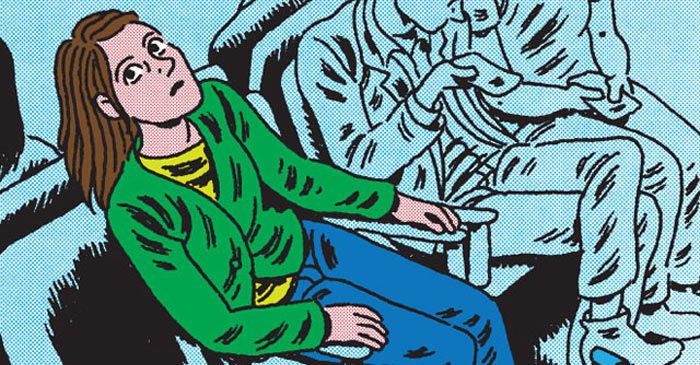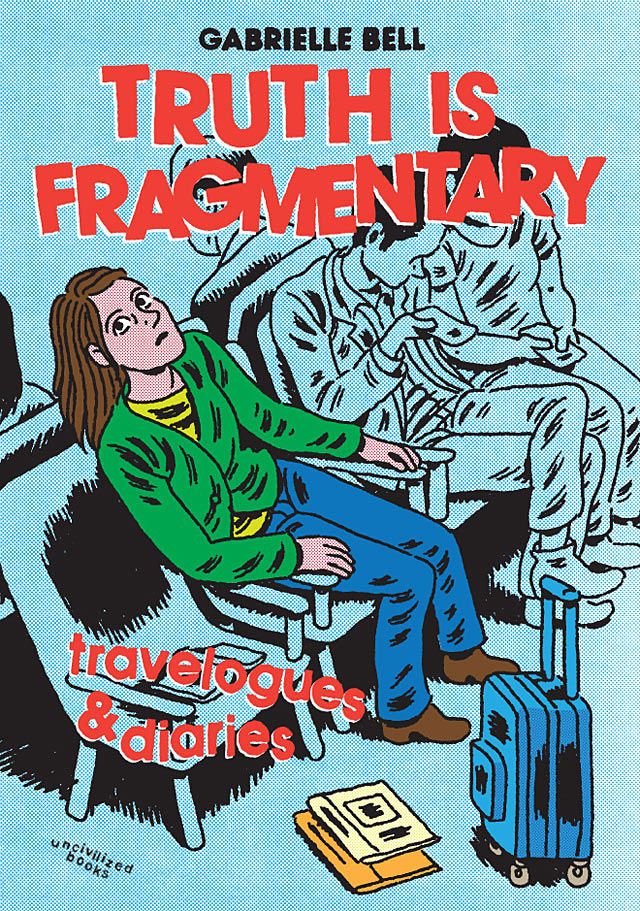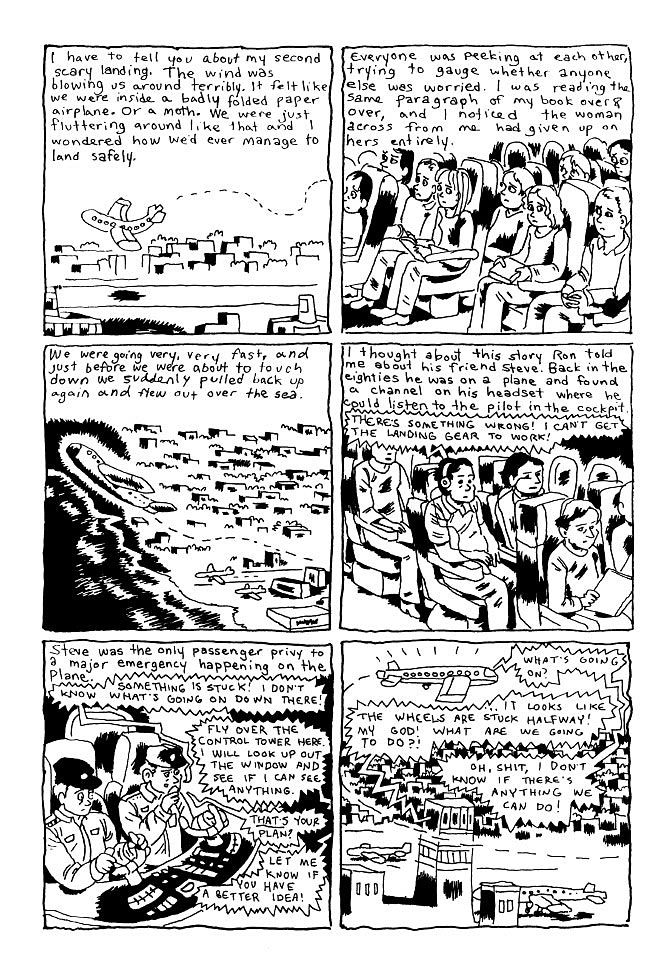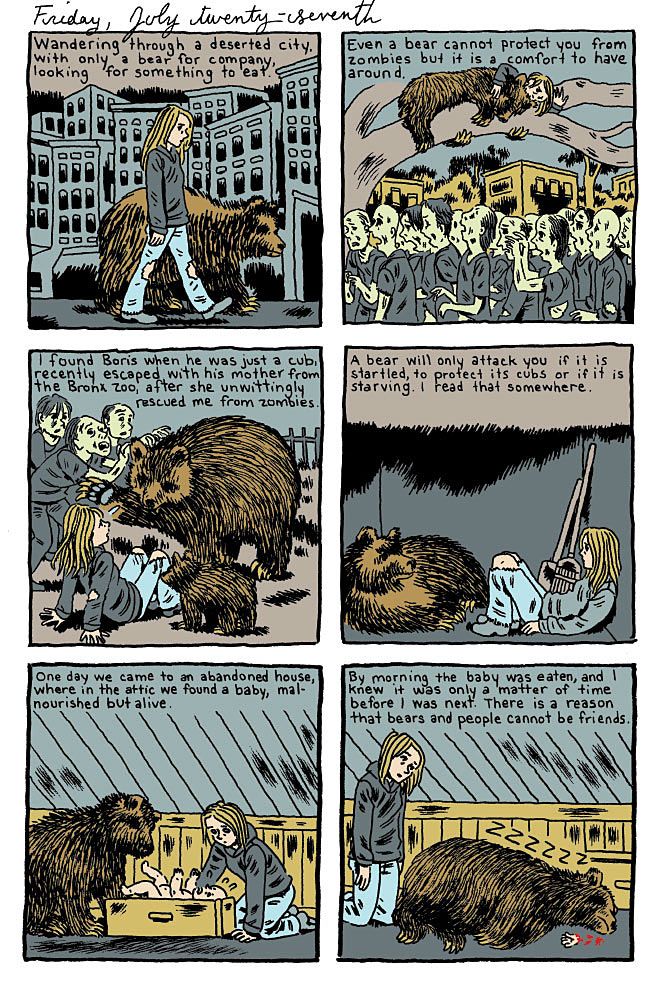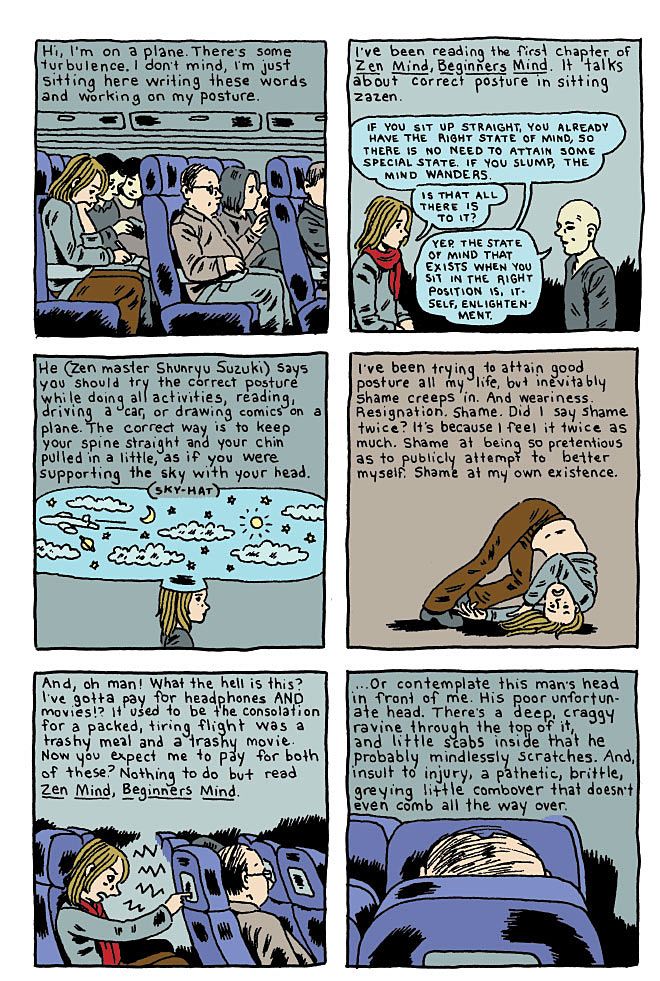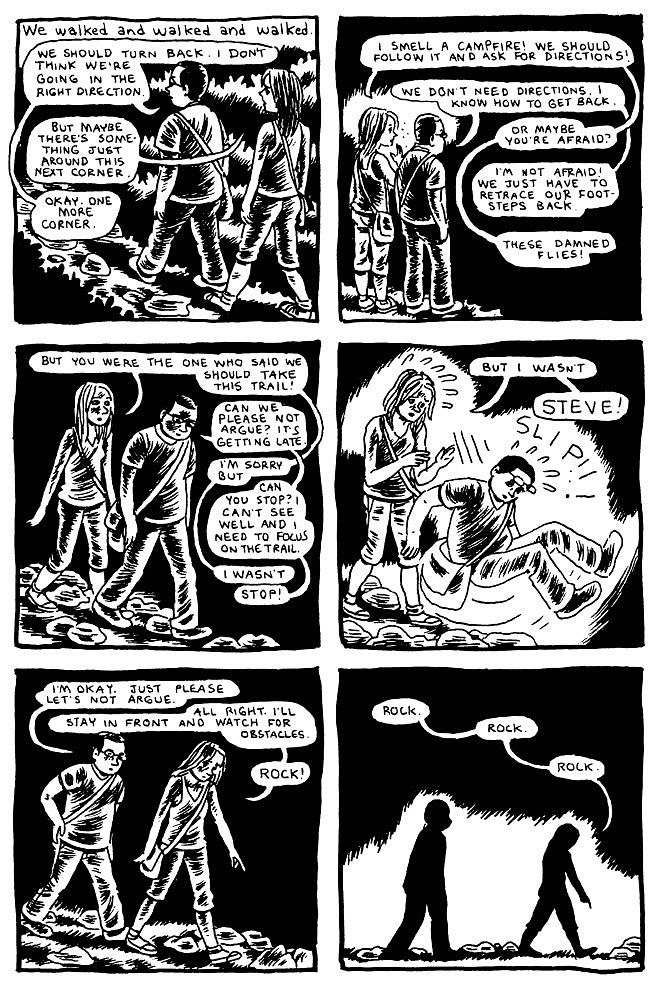Gabrielle Bell has been creating an incredible series of memoir and fictional comics in recent years. She publishes work regularly on her website, gabriellebell.com, and her stories have appeared in various anthologies including "The Big Feminist But" and the most recent issue of "Kramer's Ergot." Her previous effort, "The Voyeurs," was named one of the top five graphic novels of the year by Publishers Weekly.
Her new book from Uncivilized Books, "Truth is Fragmentary" collects the diary comics and travelogues she's been making in recent years including her series of "July Diaries" where she draws a comic every day for the month. CBR News spoke to Bell about "Truth is Fragmentary," where she draws (and blurs) the line between truth and fiction and much more.
CBR News: Gabrielle, I really loved the new book and it feels appropriate because the last time we spoke here was after you made your first round of July diaries in 2011. Was it your idea to put together the diaries and travelogues in a book?
Gabrielle Bell: I guess it was all my idea. It was an experiment I wanted to try. I didn't think that people would be that into it. In a way I did it for myself. I didn't think anyone would care if I took it all down, but especially that first year it had this good reception. People were really into it. I didn't feel the need to take it down at the end, but I had promised myself and I felt like something bad would happen if I didn't stick to my promise. [Laughs]
Tom [Kaczynski] was like, "We need to publish a book by you, what have you got?" I'm halfway through a bunch of projects and they could take years, but had all these diaries and I said, "What about that?" That's why I'm a bit more insecure about it. It's not like I spent all this time working on this thing and now I'm publishing it. I mean I did spend all my time working on it, but it wasn't towards the goal of making a book. It seems like when you consciously work towards that goal it takes longer and is harder.
RELATED: "Beta Testing" Tom Kaczynski's "Trans Terra"
Do you compose the diary comics differently from other comics?
Yes and no. I mean I try to use the comic format to telling a story and have a sort of punchline at the end. In that way I'm composing it as I would any short story, but using my own life as a template.
Are diary comics just a short compressed process of what you do in longer projects?
With fiction I have to pull stuff out of thin air. The diary stuff I already have the material and I just have to shape it into making it as palatable as possible. [Laughs] Like I'm working on "Siberia," which is posted every once in a while. That takes a lot of brainstorming and discussion because I'm collaborating [with Steven Thornton]. Basically it's a lot of discussion and coming up with ideas and rearranging them. There's a lot more work. I'm working on a couple of fictional things. It's like I have nowhere to start, but with diary comics I definitely have a place to start.
In that sense is making a diary or travelogue comic easier?
Yeah. I can do it in my sleep now, I think. [Laughs] Not quite. It still stresses me out.
At the same time using grid-style layouts must make certain things easier and free you up to focus on storytelling.
Well, I'm mostly interested in storytelling. For me all the other elements are there to serve the storytelling.
Have the July diaries gotten easier?
Actually, no. [Laughs] They've gotten harder.
Why?
I guess because I've got to try not to repeat myself. I challenge myself more. Not repeating myself is the hardest part. I guess I've just become more aware of how trite my life is. [Laughs] It just gets harder and harder. I don't know why. Every year I'm like, I'm not going to do this again next year, and then I end up doing it again the next year. It's fun for the first week and I'm like, this is easy, I can do this forever.
Is this why you've had flights of fancy in the more recent diary comics?
I think so. I get bored with my own life and think, I have to go in another direction. I mean not always. Sometimes my life seems very interesting and the people around me seem very interesting. That's enough -- but not always.
And you're not just drawing you walking to the store, you're trying for something else in the comic.
If I hear something really interesting at the store, something that illuminates the struggle then that's cool but I don't know. I guess I'm definitely looking for something. I don't know if I find it, but there's definitely the sense of searching.
I think my favorite travelogue in the book is your Colombia trip. How did you decide to approach it like that?
Having the servant, you mean?
Yes, the conceit being that you hired someone to make your diary.
[Laughs] I guess that was from Montaigne. I was reading about Michel de Montaigne and when he was traveling in Europe he had his servant keep his diary for him. It was basically, we visited this place and saw this and just listing things. I found that part was the most readable. It was very straight forward and interesting whereas Montaigne was complicated and show-offy with his language and his sentences would go around and around and I would lose the thread and I wouldn't understand what he was talking about. The secretary was very straightforward and plain and in that way I got a better idea of the trip. It was more objective. This was interesting to me. I thought what if I was writing from somebody who was not themselves. Somebody in my own mind who's just watching things rather than trying to be a writer.
You make comics in both black and white and color. Do you think of the black and white ones as finished? Is the color important for you?
I guess I started coloring when I started my blog because it was easy to do on Photoshop. I think it really changes the story. It really puts things into a sort of relief. I feel like the drawings are kind of naked without color which is probably another reason why I feel so embarrassed by the "Diaries." [Laughs] It pulls your eyes to where they're supposed to go. The subject has bright colors and then the background is more muted or more solid colors. We know where we're supposed to look. With my work too it tends to be very uniform. I'll put as much attention into the background as the foreground and so your eyes have to work a bit to figure out what's going on. So the color guides you.
RELATED: Gabrielle Bell Moves on After "Mome"
You mentioned that you're in the middle of many projects.
I would say I'm technically in the middle of two projects and there's a third project that keeps getting put down and picked up again.
Three longform projects feels like many.
And then there's an extra one that's more like an experiment than a project. I'm doing all these different things.
You've made a lot of memoir and diary comics, but you've also created a lot of fictional stories. What's the balance of them for you? What do you want the balance to be?
When I was working on those comics that became "Cecil and Jordan in New York," I was trying to do fiction -- even if it was autobiographical, it was leaning toward fiction. Then I would do the stuff that eventually became "Lucky," the diary comics, just to blow off steam. I guess I do that back and forth. I work on fictional stuff and at the same time I do some autobiography because it's easier and more instantly gratifying I tend to do more diary stuff. Then the diary stuff becomes more difficult. I go through those cycles all the time.
"Siberia" is fiction. Are the other longer projects you're working on fiction?
Yeah.
I remember when the last "Kramer's Ergot" came out people seemed a little uncertain whether your story was fiction or nonfiction.
It was a murder story!
I think many people started thinking it was autobiography and then by end thought,"Okay, this is fiction."
Yeah, there were definitely elements from my life. I grew up in Northern California and California may as well be like a color. I just happened to use California because I grew up there. This is something that writers talk about all the time. Just because it's from my life doesn't mean it's true. [Laughs] Then it gets more mixed up when I do all this true stuff. To me it's flattering that people would think it's autobiography because I really worked hard and it just means that I've pulled off fiction. I told a story that was believable. At first I was like, how could you think everything I do is autobiography? I guess there is something insulting about it, too, because it's like I'm incapable of making something up.
I wanted to ask about "Siberia," which is fiction and interesting and weird and I loved it, but I struggle to explain it to people.
Me too. It's complicated. First you have to explain everything about the Lycov family and how they were persecuted in Russia but then you have to explain all this history and you don't even get close to the story and you see people's eyes glaze over.
And then ten minutes later you're like, "And then this guy goes to Russia to meet the last member of the family."
Yes! [Laughs] I do this all the time. The Lycov family is just really fascinating. It isn't some dry history. The persecution that drove them there might be a little dry but the fact that this family just went out there and lived like "Swiss Family Robinson." I've had to pitch it or explain it to people plenty of times and sometimes I'll just say it's about this guy who moved to Russia to be an assistant to this hermit.
How did story come about? You mentioned you're co-writing it with Steven Thornton.
Me and Steve have this rapport by text message. We're constantly making up stories by text and then building on them and they just go forever. I think we get very creative with it so I said, "We need to channel this creative energy." He told me about this article he read in "Smithsonian" about this family. He saw that the only remaining member of the family, the daughter who's seventy or something, she had sent out a message to the Old Believer Church that she was looking for an assistant. He had this fantasy of going out there and being her assistant. I was like, that's great, let's turn that into a comic.
What has collaborating been like? How does it work?
It was really hard at first. I'm not used to collaborating and I'm not really fond of collaborating. [Laughs] I sort of had to beat it out of him. Now it's gotten easier because all we have to do is talk. We don't even write that much. We just go for a walk and talk about it and we'll take notes once in a while but working is mostly just talking and that's very exciting. Writing can be drudgery but talking can be fun.
I feel like I should ask, but feel bad about asking, why is it so often months between installments?
I don't know. It's my fault. [Laughs] I don't think I have the drive that I used to. I mean back when I was publishing a comic every week -- that's what became "The Voyeurs" -- I forced myself to do a comic every week no matter what. I came up with good stuff but it was all short form and I began to think that I was limiting myself by forcing myself to do something every single week because I didn't want to do these short works. I wanted to do something longer. Also sometimes they came out good and sometimes they came out bad and I wanted to give myself as much time as I needed. I wanted to take it easy and work on whatever project I wanted to. I just decided it was going to take as long as it was going to take -- even if it takes years.
Do you know how long "Siberia" will be and where it's going? Do you need to know that?
I do like to know that, otherwise I just feel pretty panicked. I think the best story is when you know how it's going to end. You don't exactly know how it's going to get to the ending but you know how it'll end and it's a matter of finding out. That said I don't know exactly how "Siberia" will end, but I have a general idea.
I love your bears, particularly as seen in the most recent chapter.
Yeah, that last chapter was really exciting. We found a YouTube clip of a grizzly attacking a deer or baby antelope. It was just so brutal and I had to watch it in slow motion and pause it every second to get the best shot I could use. It was so intense the way this huge bear would put his paw on this little creature's belly and just rip it up. [Laughs] It was really fun to translate that into the comic.
And then the cute little baby bears get into the act.
That was all very fun because we wanted to make the bear more sympathetic by having babies. [Laughs]
"Truth is Fragmentary" is out now and "Siberia" is still coming out. Is there anything else that you'll be posting on the website in the near future?
"Siberia" and then "July Diaries." I'm hoping to do some more collaborations. I'm just trying new stuff right now. I'm in the lab experimenting with different elements and trying to figure out something that works and as soon as I figure it out, I'll post it on the blog.
So you'll be doing it again this July?
I'm going to try it in a different way. I can't say how.
"Truth is Fragmentary" is on sale now from Uncivilized Books.

